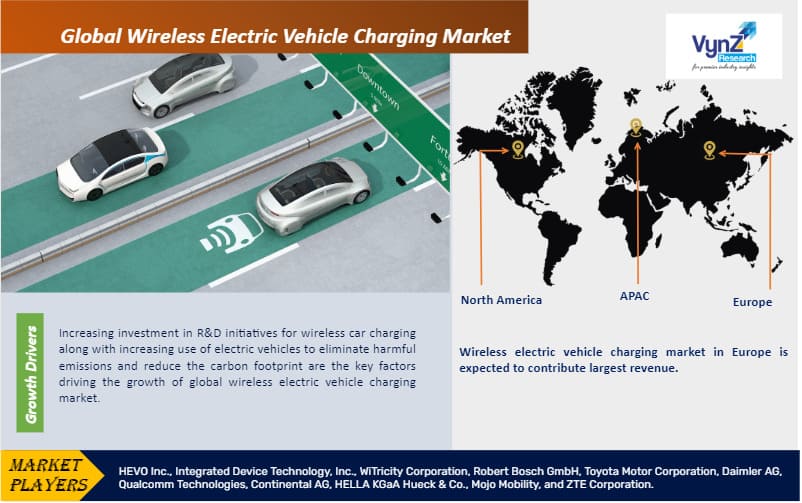Industry Overview
From USD 0.08 billion in 2023, the Global Wireless Electric Vehicle Charging Market is predicted to grow to USD 1.8 billion by 2030, registering a CAGR of 56% during the forecast period (2025–2030). The growth of this market is attributed to the increasing awareness of protecting the environment and restricting the use of fossil fuels, which has stimulated governments and various institutions to invest in R&D for wireless car charging. Moreover, wireless electric cars use power by use of electric motors that run on rechargeable battery packs, which results in less pollution and is environmentally friendly in comparison to that of conventional vehicles.

Different electric utilities provide charging stations where these vehicles are charged. Electromagnetic fields are the way through which the wireless cars are charged. This helps the user to conveniently charge the vehicle by not plugging in the vehicle but just parking it over an inductive pad. Additionally, it makes it convenient for the user to charge the vehicle, and the vehicle gets charged at a higher rate which saves time. This technology offers effective charging and safe charging. Furthermore, there have been initiatives taken to increase the number of charging stations over the world which would be favorable for the growth of the wireless electric vehicle charging market.
Wireless Electric Vehicle Charging Market Segmentation
Insight by Charging Type
Based on charging type, the global wireless electric vehicle charging market is bifurcated into dynamic wireless charging systems and stationary wireless charging systems. During the forecast period, the dynamic wireless charging of electric vehicle classification is expected to witness faster wireless electric vehicle charging market growth, as it is a revolutionary technology for the market. In the conventional approach, the cars have to set a limit of the range of a kilometer, beyond which if the battery capacity is increased the cost and charging time increase, and with a dynamic wireless charging system the battery remains the same while the travel range increases thus resulting in cost reduction.
Insight by Application
Based on application, the global wireless electric vehicle charging market is bifurcated into home charging units and public or commercial charging stations. Between these, public or commercial charging station is expected to witness higher CAGR during the forecast period, as the charging units for public or commercial charging stations would require fast charging facilities so the vehicles are charged at a better rate in comparatively less time.
Insight by vehicle type
Based on vehicle type, the global wireless electric vehicle charging market is bifurcated into commercial vehicles and passenger cars. Amongst these segments, the commercial vehicle segment is expected to witness a higher CAGR during the forecast as the demand for commercial charging stations to be developed is comparatively higher.
Global Wireless Electric Vehicle Charging Market Report Coverage
|
Report Metric
|
Details
|
|
Historical Period
|
2018 - 2023
|
|
Base Year Considered
|
2024
|
|
Forecast Period
|
2025 - 2030
|
|
Market Size in 2024
|
U.S.D. 0.8 Billion
|
|
Revenue Forecast in 2030
|
U.S.D. 1.8 Billion
|
|
Growth Rate
|
56%
|
|
Segments Covered in the Report
|
By Charging Type, By Application,By vehicle type
|
|
Report Scope
|
Market Trends, Drivers, and Restraints; Revenue Estimation and Forecast; Segmentation Analysis; Impact of COVID-19; Companies’ Strategic Developments; Market Share Analysis of Key Players; Company Profiling
|
|
Regions Covered in the Report
|
North America,Europe,Asia-Pacific (APAC),Rest of the World (RoW)
|
Industry Dynamics
Wireless Electric Vehicle Charging Industry Trends
Increasing global trends about charging infrastructure and electric mobility are the key trends observed towards the growth of the global wireless electric vehicle charging market. Electric mobility is gaining momentum in the automotive industry as it refers to the development of electronic drive trains and comprises fully hybrid vehicles and electric vehicles.
Wireless Electric Vehicle Charging Market Growth Drivers
Increasing investment in R&D initiatives for wireless car charging along with increasing use of electric vehicles to eliminate harmful emissions and reduce the carbon footprint are the key factors driving the growth of the global wireless electric vehicle charging market. Major leading companies that contribute a substantial growth in the economy have started to invest more in the R&D for the wireless charging vehicle market. Furthermore, there has been an escalation witnessed in the use of electric vehicles to eliminate harmful emissions for carbon footprint reduction. These factors explained play as the growth drivers for the market.
Wireless Electric Vehicle Charging Market Challenges
However, there has been a lack of confidence among consumers related to infrastructure support for such technology along with a lack of product standardizations are the key factors expected to hinder the growth of global wireless electric vehicle charging markets.
Wireless Electric Vehicle Charging Market Geographic Overview
Geographically, the wireless electric vehicle charging market in Europe is expected to contribute the largest revenue by 2030 due to accessibility to well-organized infrastructure that enhances the establishment of wireless charging infrastructure in this region. The development of effective infrastructure with access to a large number of charging stations along with a massive increase in the sale of electric vehicles in the region are the key factors driving the growth of the global wireless electric vehicle charging market.
Moreover, the wireless electric vehicle charging market in Asia-Pacific is projected to witness the highest growth during the forecast period. The wireless electric vehicle charging market in Asia-Pacific is growing as a large part of the global manufacturing units are present in the region along with the increasing world population in the region has accentuated the pollution parameters that are emphasizing upon the acceptance of the electric vehicle. The government in the countries of this region is keen on the conversion of the economy to go completely electric thereby contributing towards the growth of the wireless electric vehicle charging market.
Wireless Electric Vehicle Charging Market Competitive Insight
Key players operating in the global wireless electric vehicle charging market are emphasizing their efforts upon strategic acquisitions to strengthen capabilities of research & development that support them in providing innovative solutions to the users and thus gain competitive advantage. Furthermore, the key players such as WiTricity is undertaking product development and mergers & acquisitions activities.
Some of the major players operating the global wireless electric vehicle charging market include HEVO Inc., Integrated Device Technology, Inc., WiTricity Corporation, Robert Bosch GmbH, Toyota Motor Corporation, Daimler AG, Qualcomm Technologies, Continental AG, HELLA KGaA Hueck & Co., Mojo Mobility, and ZTE Corporation.
Primary Research
VynZ Research conducts extensive primary research to understand the market dynamics, validate market data, and have key opinions from industry experts. The key profiles approached within the industry include, CEO, CFO, CTO, President, Vice President, Product Managers, Regional Heads, and Others. Also, end user surveys comprising of consumers are also conducted to understand consumer behavior.
The Wireless Electric Vehicle Charging Market report offers a comprehensive market segmentation analysis and estimates for the forecast period 2025–2030.
Segments Covered in the Report
- Component
- Base Charging
- Power Control Unit
- Vehicle Charging Pad
- Distribution Channel
- Application
- Home Charging Unit
- Public Or Commercial Charging Station
- Charging Type
- Dynamic Wireless Charging System
- Stationary Wireless Charging System
- Vehicle Type
- Commercial Vehicle
- Passenger Car
- Charging System
- Magnetic Power Transfer
- Capacitive Power Transfer
- Inductive Power Transfer
- Supply Range
- Propulsion
Geographical Segmentation
- North America
- Europe
- Germany
- U.K.
- France
- Italy
- Spain
- Russia
- Rest of Europe
- Asia-Pacific (APAC)
- China
- Japan
- India
- South Korea
- Rest of Asia-Pacific
- Rest of the World (RoW)
- Brazil
- Saudi Arabia
- South Africa
- U.A.E.
- Other Countries
.png)
Source: VynZ Research
.png)
Source: VynZ Research




.png)